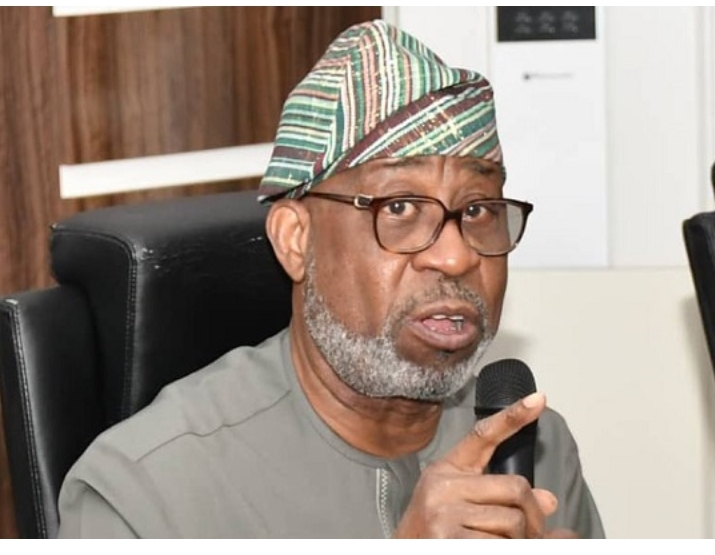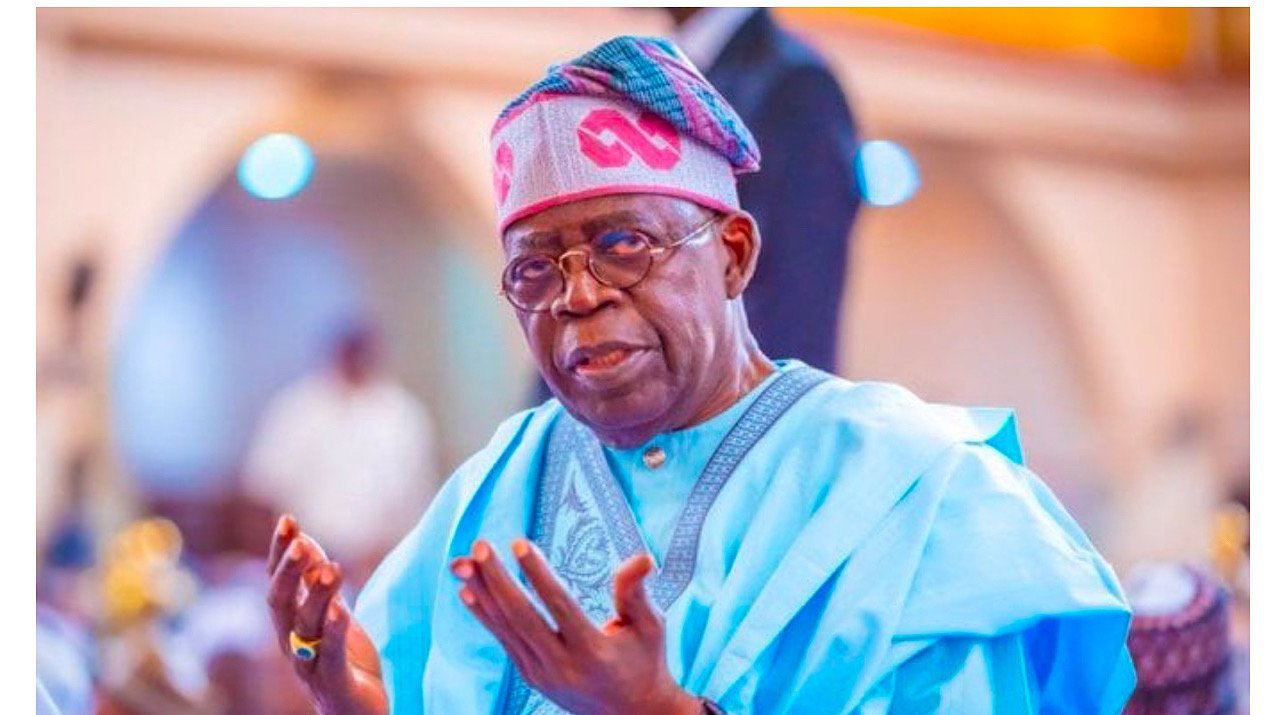news
UNGA 2023 : Nigeria’s minerals deposit is worth $700billion,”We are ready to play an important role,” Says Alake

 The Minister of Solid Minerals Development, Dele Alake, said Nigeria’s minerals deposit is worth $ 700 billion, saying the nation’s mineral resources make it one of the top 10 players in the energy sector.
The Minister of Solid Minerals Development, Dele Alake, said Nigeria’s minerals deposit is worth $ 700 billion, saying the nation’s mineral resources make it one of the top 10 players in the energy sector.
Alake said this at a special session on the sidelines of the ongoing United Nations General Assembly (UNGA) in New York, where he added that Nigeria is ready to play an important role in meeting the global demand for critical minerals.
The minister spoke on the topic: “From critical minerals to energy transition: Africa in the driver’s seat” at the event organised by the Corporate Council of Africa.
The deputy director of information, Ministry of Solid Minerals, Alaba Balogun, made this known in a press release.
Balogun added: “Alake who was speaking at a special session on the sidelines of the ongoing United Nations General Assembly in New York, said the nation’s mineral resources make it one of the top 10 players in the energy sector.
“He said despite being behind other African countries in mining, Nigeria’s mineral deposit is valued at over $700bn with very huge potential to increase. Speaking broadly of the continent, Alake said Africa is fit for the driver’s seat of the global energy transition that will be driven by critical minerals.”
He said: “Nigeria has always occupied a special position in global energy discourse. Nigeria played a vital role as a key oil exporter during the era of hydrocarbon and became a top 10 exporter of oil. As the face of global energy changes, Nigeria once again emerges as a key supplier of gas which we know is an important energy transition fuel today. Last year in the midst of the Russia-Ukraine crisis, Nigeria was one of the top exporters of LNG to Europe and was the 6th largest LNG global exporter in 2022. As you can see, there is a clear trend, whenever Nigeria is active in the global energy space, it emerges as a top 10 global player and it will be no different with critical minerals.
“Nigeria is endowed with a vast deposit of minerals critical to our new world. In our new world mobility requires a new form of energy driven by minerals in our new electric vehicle world; technology is more mineral-dependent; our energy source will depend more on the energy converted from the sun and other sources; and energy storage is even more mineral-reliable.
“This trend does not have any reversal in sight and demand will only continue particularly as the world seeks and envisions a lower carbon future where environment, social, and governance (ESG) factors are prioritized in governance and investment decisions. Therefore, minerals are at the forefront.
“He also traced the transition from different sources of energy to the now prominent renewable sources of energy. The shift from fossil-based energy systems to renewable energy such as wind and solar has meant that minerals that were not a part of general and public parlance have become a part of everyday speech. Today, lithium for example is woven through everyday conversations, and this is only just the beginning.
“Without a doubt, minerals are a major focus of our world today, and rightly so. Nigeria is well-positioned to play an important role in our new world. Our Solid mineral sector is valued at over USD$700bn and we know there is more to be discovered. Endowed with critical minerals, Nigeria should not and dare I say, cannot be ignored.
“We may not have a strong historic mining history like some of our neighbours such as Ghana, Mali and those in the South such as South Africa, Botswana, etc. but things are about to change.”
According to him, Lithium pegmatite rocks are available in Nigeria across states such as Nasarawa, Kwara, Oyo, Abuja, Kebbi, and much more and Graphite is found in states such as Kaduna.
One of the key objectives of President Bola Tinubu’s administration according to Alake is to develop the entire value chain in-country – in the case of lithium, saying “We want to go from Ore to concentrate to lithium hydroxide to end product.”
He also listed states with rare Earth elements critical for wind turbines and EV motors as Nasarawa and Plateau.
He added: “Platinum group minerals can be seen in the middle belt such as Benue and other regions. We have nickel in Kaduna and other locations. Zinc which is vital to offshore and onshore wind power generation has been a mainstay in Nigeria and is available in Ebonyi, Nasarawa, Plateau and many other Nigerian states.
“He further added that the nation was ready for foreign investment in the solid mineral sector, with President Bola Tinubu giving it prominence.
“It is clear that Nigeria is important to the world and we are ready for investment, collaboration, and partnerships in our solid mineral sector. Our new president, President Bola Ahmed Tinubu has made the solid mineral development sector vital in his administration and we are committed to making it a key contributor to our national GDP. A lot of work has been done in the sector under former administrations and we plan to take it further. Nigeria is prime to becoming a mining destination on the continent and it will happen in our time.”
news
Update : Seyi Tinubu Responds to King Mitchy, VeryDarkMan Saga


Seyi Tinubu, son of President Bola Tinubu, has issued a statement debunking allegations linking him to a feud between social media personalities Martins Vincent Otse, popularly called VeryDarkMan, and Mitchell Mukoro, widely known as King Mitchy.
The controversy stems from claims suggesting an improper relationship or secret arrangements between Seyi Tinubu and King Mitchy, which VeryDarkMan has reportedly used to intensify his online narrative.
Our correspondence reports that philanthropist and content creator King Mitchy recently announced that she renovated a dilapidated school in six days, suggesting that the project was proof that meaningful change could happen swiftly when there was genuine intent.
However, she reportedly made comments widely interpreted as subtle jabs at VeryDarkMan, who, in turn, accused her of being used as a political pawn to launder the image of President Bola Tinubu’s administration.
Tagging the President’s son. VeryDarkMan was said to have alleged in another video that both Seyi Tinubu and King Mitchy were threatening his life.
Addressing the comments in a statement shared on Instagram on Saturday, Seyi Tinubu categorised the allegations and insinuations as false.
He clarified the nature of his interaction with King Mitchy, framing it strictly within the bounds of his long-standing philanthropic work.
Tinubu wrote, “I met Mitchy once, in a public setting, alongside others. On that occasion, I provided financial support toward her NGO activities, just as I have supported many young Nigerians and organisations working to empower our people.
“A follow-up meeting had been scheduled for me to receive an update on the impact of her NGO’s work following the donation. That meeting did not take place because I have been unwell.”
He categorically denied any private encounters, saying, “There has never been a private encounter, no secret arrangement, and no impropriety of any kind.”
Tinubu took direct aim at VeryDarkMan, accusing the activist of using a feud he had no part in to attack his reputation.
He wrote, “What is deeply concerning is that a feud I did not start, and in which I have played no part, has been used as a vehicle to insert my name into a narrative without basis in truth.
“For reasons best known to him, VDM appears to have been looking for a trigger, an opportunity to attack and attempt to harm my reputation and seized upon this situation to do so. I will not accept that.
“If my name generates attention, let us at least deal in facts. Supporting charitable causes is not a crime. Meeting someone publicly to support their NGO is not a scandal. Repeating falsehoods loudly does not transform them into truth.”
Tinubu asserted that he won’t be intimidated by “fictional” narratives, emphasising that he refuses to be bullied.
“I will not be bullied, and I will not dignify fiction with panic.
“I have experienced bullying before, and I understand the harm it can cause. That is why I take a firm stance against it,” he said.
Tinubu concluded by reaffirming his commitment to serving Nigerian youth through his foundation, insisting that “philanthropy and outreach must never be politicised or weaponised.”
“To those seeking to manufacture controversy: Nigeria needs builders, not bullies. We need responsible discourse, not sensationalism driven by speculation.
“I firmly reject the accusations made against me. I call for de-escalation, for restraint, and for a return to truth and responsibility,” he added.
news
Security Reform: Tinubu Calls for Urgent Constitutional Backing for State Police


…raises fresh alarm over terrorism, banditry at State House Iftar
…Akpabio pledges more support, vows no executive bill will die in Senate
President Bola Ahmed Tinubu on Wednesday night formally urged the Senate to begin the process of amending the 1999 Constitution to provide for the establishment of state police, declaring that Nigeria must urgently restructure its security architecture to confront terrorism, banditry and insurgency.
Speaking at an interfaith breaking of fast with the leadership and members of the Senate at the State House, Abuja, the President said the time had come for lawmakers to “start thinking” about embedding state policing in the Constitution to enable governments at subnational levels better secure their territories.
“Nigeria is extremely challenged, we are facing terrorism, banditry, insurgency, but you never failed to make a right response to these calls. What I will ask for tonight is for you to start thinking how best to amend the Constitution to incorporate the state police for us to secure our country, take over our forests from marauders, free our children from fear”, Tinubu said.
The President’s latest appeal adds momentum to a campaign he has sustained since early in his administration.
In February 2024, during an emergency meeting with the 36 state governors at the State House, Tinubu approved the creation of a joint committee of federal and state representatives to explore modalities for establishing state police, insisting that the country must “move aggressively” to improve security of lives and property.
He renewed the call in November 2025, urging the National Assembly to begin reviewing relevant laws to allow states willing to establish their own policing structures to do so.
At the APC National Caucus meeting in December 2025, he again pressed governors and lawmakers to back constitutional reforms for state police and local government autonomy.
Only days ago, at an interfaith breaking of fast with governors at the Presidential Villa, the President declared that state police “can’t wait” and “will not be postponed,” urging preparations for what he described as a necessary shift in the nation’s security architecture.
At Wednesday’s gathering with senators, Tinubu framed the proposed reform as a constitutional obligation anchored on unity and shared responsibility.
“What you have faced in the challenging period of this country, the terrorism and banditry, is causing us havoc and we should pull together, unite in a way that our forefathers contemplated to bring about a constitutional democracy and pull us together. They didn’t say we should fight,” he said.
Beyond security, the President expressed deep appreciation to lawmakers for supporting what he described as bold and necessary economic reforms.
“I have a lot of credit for bold reforms. Without your collaborations, without your inspirations, those reforms are not possible. We are reformists together,” he said.
Tinubu defended the removal of petrol subsidy and foreign exchange reforms, describing them as steps taken to halt “monumental corruption.”
“What we gave up and what we stopped is a monumental corruption in subsidy. We gave it up. We don’t want to participate in monumental corruption, in arbitrage, foreign exchange,” he stated.
‘Amend Constitution to accommodate state police’
State police and questions Nigeria can no longer avoid
Senate backs state police, technology-driven reforms to boost Nigeria’s security
According to him, the reforms have laid the foundation for economic stability.
“You don’t have to chase me for dollars. In the past, you could see what Nigeria is today. You should be proud… What we are enjoying is stable economy, prosperity beckoning on us. We just need to work hard for it,” he added.
Responding to criticisms from political opponents, the President dismissed claims that he was stifling opposition voices.
“When they accused me of killing oppositions, I didn’t have a gun… I can’t blame anybody from jumping out of a sinking ship if they did,” he said, in apparent reference to recent defections.
He described the coincidence of Ramadan and Lent as symbolic of national unity and called for continued harmony between the executive and legislature.
“We are committed to Nigerian entity succeeding. We are committed to make law for the welfare, prosperity of the country. I think we are committed together to govern together,” he said.
In his response, President of the Senate, Senator Godswill Akpabio, assured the President of the chamber’s loyalty and continued cooperation.
“We have nothing to give to you than to assure you of our loyalty,” Akpabio said. “I’m sure you have noticed that nothing you have ever sent to us died in first reading, and it will never happen.”
He said the Senate painstakingly reviews executive proposals to ensure they serve national interest, even when they initially attract criticism.
“We sit down to painstakingly go through everything that comes before us, and then at the end, we see that it is in the interest of Nigerians, even when the social media is not seeing it,” he said.
Akpabio commended Tinubu’s tax reforms, foreign exchange unification, fuel subsidy removal and the recent electoral amendment, noting that the President promptly assented to the revised Electoral Act when convinced it served national interest.
He expressed optimism that by 2031, Nigeria would be more prosperous under Tinubu’s leadership and offered prayers for peace amid what he described as “troubles and sponsored insecurity” in parts of the country.
The Senate President also thanked Tinubu for appointing former Senator Jimoh Ibrahim as an ambassador, describing it as recognition of legislative talent.
The interfaith gathering ended with prayers for unity, wisdom and strength for the nation’s leaders as they navigate security and economic challenges.
news
BREAKING: Tinubu Names Tunji Disu Acting Inspector General After Egbetokun’s Exit


President Bola Tinubu has accepted the resignation of the Inspector-General of Police, Kayode Egbetokun, and approved the appointment of Tunji Disu as Acting Inspector-General of Police with immediate effect.
Our correspondent had earlier reported that Egbetokun tendered his resignation letter on Tuesday, citing pressing family considerations.
Appointed in June 2023, Egbetokun was serving a four-year term scheduled to conclude in June 2027, in line with the amended provisions of the Police Act.
In a statement issued on Tuesday by his Special Adviser on Information and Strategy, Bayo Onanuga, the President received the letter earlier on Tuesday and expressed appreciation for his service to the nation.
He also commended Egbetokun’s “decades of distinguished service to the Nigeria Police Force and the nation,” acknowledging his “dedication, professionalism, and steadfast commitment to strengthening internal security architecture during his tenure.”
“In view of the current security challenges confronting the nation, and acting in accordance with extant laws and legal guidance, President Tinubu has approved the appointment of Assistant Inspector-General of Police Tunji Disu to serve as Acting Inspector-General of Police with immediate effect.
“The President is confident that AIG Disu’s experience, operational depth, and demonstrated leadership capacity will provide steady and focused direction for the Nigeria Police Force during this critical period,” the statement read.
It added that in compliance with the provisions of the Police Act 2020, the President will soon convene a meeting of the Nigeria Police Council to formally consider Disu’s appointment as substantive Inspector-General of Police, after which his name will be forwarded to the Senate for confirmation.
The President reaffirmed his administration’s commitment to enhancing national security, strengthening institutional capacity, and ensuring that the Nigeria Police Force remains professional, accountable, and fully equipped to discharge its constitutional responsibilities.
-

 news5 years ago
news5 years agoUPDATE: #ENDSARS: CCTV footage of Lekki shootings intact – Says Sanwo – Olu
-

 lifestyle6 years ago
lifestyle6 years agoFormer Miss World: Mixed reactions trail Agbani Darego’s looks
-

 health5 years ago
health5 years agoChairman Agege LG, Ganiyu Egunjobi Receives Covid-19 Vaccines
-

 lifestyle4 years ago
lifestyle4 years agoObateru: Celebrating a Quintessential PR Man at 60
-

 health6 years ago
health6 years agoUPDATE : Nigeria Records 790 new cases of COVID-19
-

 health6 years ago
health6 years agoBREAKING: Nigeria confirms 663 new cases of COVID-19
-

 entertainment1 year ago
entertainment1 year agoAshny Set for Valentine Special and new Album ‘ Femme Fatale’
-

 news9 months ago
news9 months agoBREAKING: Tinubu swears in new NNPCL Board


